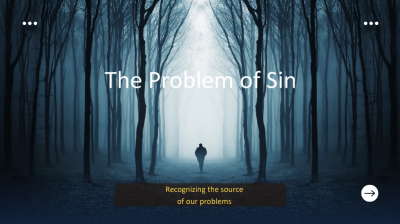Recognizing the Real Problem: How Sin Distorts and Destroys Everything
In this third session of our series, we are turning to a foundational, yet often overlooked, reality: the way sin impacts both teaching and learning. As school leaders, we cannot view education merely as the transfer of knowledge or the development of skills. Education is always moral and spiritual, shaped either by truth that comes from God or by distortions introduced by sin.
Scripture reminds us that “In the beginning, God” (Gen. 1:1). This establishes God as the source of truth, beauty, and goodness. Yet in Genesis 3, Adam and Eve rejected His wisdom, choosing instead to define truth for themselves. Their rebellion was more than disobedience—it was an epistemological revolt, a rejection of reality as God defined it. That same distortion continues to influence human thought, desire, and purpose today. We as well as our students want to define truth for ourselves! 
Sin's impact on life
The effects of sin extend into every dimension of life: rebellion against God, brokenness in relationships, disorientation within ourselves, and conflict with the created order. In education, these distortions are especially evident. Sin reshapes how we approach truth—driving us to bend facts around personal desires rather than submitting to objective reality. It fuels intellectual arrogance, where knowledge is pursued for power, status, or control rather than wisdom and service. It separates knowledge from its moral and spiritual context, leaving learning fragmented and often hollow.
Sin's impact on learning
These realities directly impact school culture. Students resist accountability, struggle to connect character with learning, and experience fractured relationships marked by gossip, blame-shifting, and resentment. A hardened heart resists correction, undermining both academic growth and spiritual formation. As Saint Augustine once reflected in Confessions, “I learned nothing unless compelled.” Left unchecked, sin breeds apathy, dishonesty, and hostility in the classroom.
The solution
But this diagnosis is not without hope. The gospel speaks directly into education. Christ not only reconciles us to God but also restores our relationships with others, ourselves, and creation. As leaders, our call is not merely to manage schools but to shape souls. We must name sin honestly while offering the redemptive hope of Christ. Our schools are to be “contrast communities”—places of truth, grace, and purpose in a broken world.
Paul reminds us in 2 Corinthians 5:17–20 that we are ambassadors of reconciliation. Christian education, then, must flow from humility, reverence, and dependence on God. Every subject should connect to His redemptive story and equip students to glorify Him.
The task before us is not simple, but it is profoundly hopeful. For in Christ, sin is a defeated foe.
Questions for Reflection and Application
To help apply these ideas in your school context, consider the following:
- In what ways do you see the effects of sin—such as resistance to truth, dishonesty, or relational brokenness—impacting the culture of your school, and how might you name these realities honestly without creating a culture of shame?
- How can your teaching and leadership practices intentionally connect every subject and activity to God’s redemptive story, so that learning is not just about knowledge but about formation in truth, beauty, and goodness?
- What would it look like for your school to become a “contrast community”—a place where students and staff experience reconciliation, grace, and purpose that stands against the fragmentation of the world?
Restoration begins with salvation in Christ. Through His grace we are reconciled to God, and our lives are redirected from self-worship to the true worship of the Creator, as Paul reminds us in Romans 1. Worship in this sense is not merely a song on Sunday but a daily re-centering of our lives on God rather than on ourselves.


